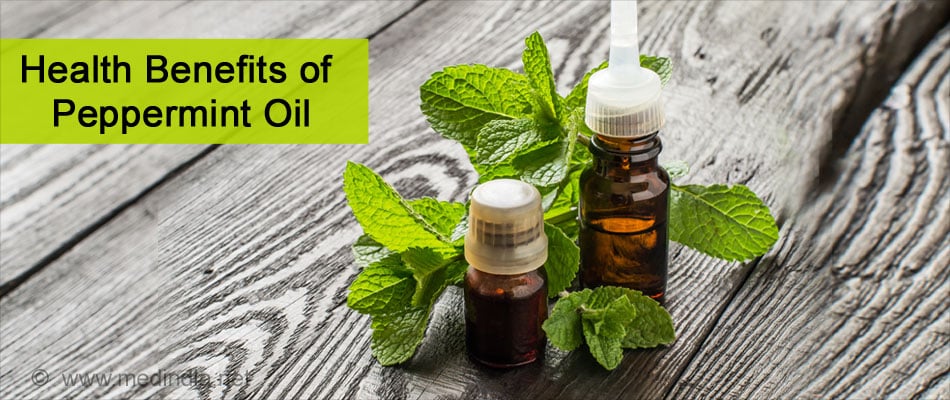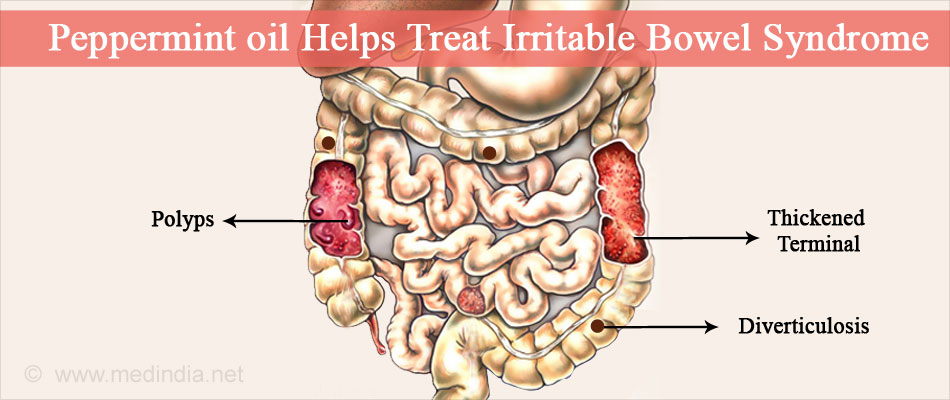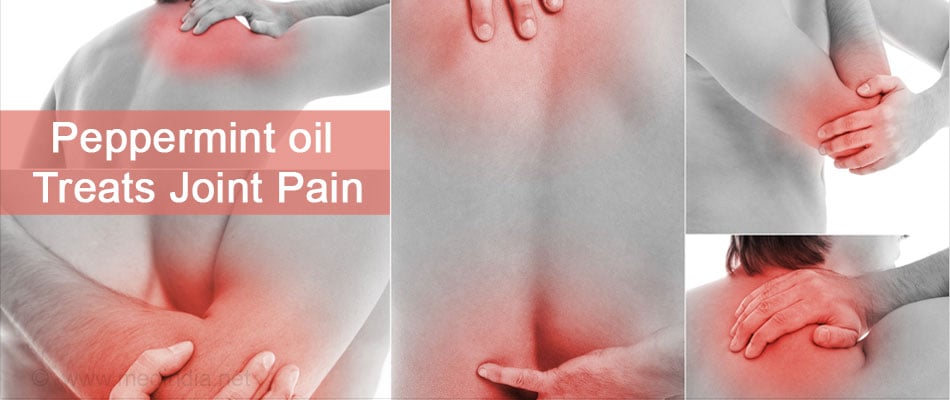- 31 Surprising Peppermint Oil Benefits & Uses - (https://www.organicfacts.net/health-benefits/essential-oils/health-benefits-of-peppermint-oil.html)
What is Peppermint Oil?
Peppermint is the cross between spearmint and water mint. The plant is native to Europe and North America.
Peppermint oil is gathered by steam distillation of the fresh aerial parts of the flowering plant.

This essential oil has antimicrobial properties and suitable for oral and topical uses. It is also used as a key ingredient in skin cream or ointment, as a fragrance in soaps and cosmetics and a flavoring agent in foods and beverages. The two primary active ingredients in peppermint oil are menthol and menthone.
Health Benefits of Peppermint Oil
Peppermint oil is used to treat a variety of health conditions. Peppermint oil is rich in vitamins and minerals. It contains minerals such as iron, folate, manganese, magnesium, calcium, potassium, and copper. It also contains vitamin A and C and omega-3 fatty acids.
Helps Treat Respiratory Problems
Menthol, the active ingredient in peppermint oil helps to remove respiratory tract infections. It is proven to have an antispasmodic, expectorant and anti-inflammatory effect. Peppermint oil provides instantaneous relief for numerous respiratory problems such as asthma, bronchitis, sinusitis, nasal congestion, cold, and cough. Peppermint oil is used in cold rubs and balms. Peppermint oil can be inhaled to unclog sinuses and offer relief.
Natural Painkiller
Peppermint oil is a natural painkiller and muscle relaxant. It can be used externally on the affected areas to provide relief from pain. Peppermint oil is also called as a “refrigerant” due to its natural cooling effect. Thus, it provides instant cooling sensation to any affected area. Peppermint oil has calcium antagonism, which helps remove pain. Peppermint oil can be applied topically to a wound or injury to accelerate the healing process. It reduces swelling and eliminates the chances of inflammation.
Reduces Fever
Peppermint oil is an excellent treatment to bring down the temperature especially in children. Due to its cooling effects, it helps reduce fever. As an alternative to drugs, few drops of peppermint oil are rubbed on the neck and soles to stabilize temperature.
Treats Urinary Tract Infections (UTIs) and Polycystic Ovarian Syndrome (PCOS)
Traditionally, peppermint oil is used to treat urinary tract infections (UTIs). The antibacterial properties of peppermint oil are the underlying reason it can reduce the symptoms and frequency of urinary tract infections in alternative applications. For women who suffer from polycystic ovarian syndrome (PCOS), peppermint oil can provide relief. It helps balance hormones and relieves symptoms of PCOS.

Prevents Food Cravings
Peppermint oil helps reduce appetite and prevents craving for junk food. Inhaling peppermint oil provides a feeling of fullness and prevents the intake of extra calories. It is advised to apply a drop or two of peppermint oil on the chest or inhale the aroma for the beneficial effect.
Boosts Immunity
Peppermint oil improves immune levels to fight against various diseases. It is also known to have potent antiviral, antibacterial, and antifungal effects, thus, used in many alternative treatments. The active ingredients in peppermint oil such as camphor, menthol, and carvacrol are resistant to certain bacterial strains like E.coli, salmonella, and staphylococcus infections.
Promotes Hair Growth
Peppermint oil is used as a vital ingredient in shampoo and conditioner due to its cooling effect. It improves blood circulation and stimulates hair growth. Peppermint oil has been widely used as a remedy for dandruff, lice, and other hair-related conditions. Most of the hair care products contain peppermint oil as it can nourish damaged hair and improve hair density. For many decades, peppermint oil is used to prevent hair loss and thinning. Menthol in peppermint oil provides a cooling sensation to the head and relieves the scalp from irritation and dryness. Peppermint oil is an alternative solution for those who suffer from baldness. It increases blood circulation to the scalp and promotes healthy hair growth.

Good for Skin and Nails
Owing to its anti-inflammatory properties, peppermint oil is used to treat skin disorders. It is applied topically to treat eczema and psoriasis. Due to its cooling sensation, it is used as an ingredient in lip balms, body lotions, and skin creams. Peppermint oil hydrates skin and helps retain moisture. It nourishes dull skin and improves the texture of oily or greasy skin. The anti-microbial effect of peppermint oil is beneficial to help cure acne naturally.
Aids in Digestion
Peppermint oil aids in digestion. For those with digestive problems, drinking a glass of water with two drops of peppermint oil after their meal provides beneficial digestive properties. The carminative properties of peppermint oil help remove gas and prevent bloating. It helps relax the smooth muscles of the gastrointestinal (GI) tract and also treat motion sickness and diarrhea.
Treats Irritable Bowel Syndrome
Peppermint oil taken in the form of a capsule has proven to be effective to treat irritable bowel syndrome (IBS). Every year, millions of people suffer from IBS, which is characterized by abdominal pain and discomfort. Peppermint oil is used as an alternative drug to reduce spasms of the colon by relaxing the muscles of the intestines. Some studies have found that peppermint oil can reduce the symptoms of IBS by 50%. Peppermint oil is also used as a natural remedy for colic. Studies have shown that peppermint oil is equally effective as the drug Simethicone for treating infantile colic, without any side effects.

Natural Mouth Freshener
For centuries, peppermint oil is used as a natural mouth freshener. It eliminates bad breath and prevents dental cavities. Studies have shown that peppermint oil reduces cavities better than the mouthwash. Peppermint oil is most commonly used in toothpaste and mouthwash. It also reduces the pain associated with teething in infants and toothache in adults. Inhaling peppermint oil after dental surgeries can help relieve pain.
Treats Prostate Cancer
Clinical studies have shown that peppermint oil inhibits the growth of prostate cancer due to the compound menthol. Preliminary studies have been carried out to find the beneficial effects of peppermint oil in protecting against radiation-induced DNA damage and cell death.
Treats Joint Pain and Curbs Allergies
Peppermint oil is topically applied on joints to relieve pain. It helps the joint muscles to relax and provides instant relief. The cooling sensation of peppermint oil is beneficial to treat joint ache. Peppermint oil relaxes muscles in the nasal passages and can help eliminate the dirt and pollen during allergy season. Topical application of peppermint oil on rash soothes the skin and prevents itching.

Improves Mental Health
Peppermint oil is an essential oil to reduce stress and improve concentration and alertness. For those with chronic fatigue syndrome, peppermint oil helps improve focus and concentration. Peppermint oil also provides relief from depression and mental exhaustion due to its refreshing nature. It is also effective against anxiety and restlessness. The relaxing and calming effect of peppermint oil stimulates mental activity, clears the mind, and increases focus on cognitive tasks.
Suppresses Nausea and Headache
Peppermint oil is a natural treatment for nausea, headache, and migraines. This essential oil can improve circulation, relax the muscles and heal the gut. All these conditions are known to cause headaches. Peppermint oil provides instant relief from a headache. Topical application of peppermint oil on the forehead is an excellent home remedy for a headache. The cooling and anti-inflammatory properties are the reason peppermint oil relieves a headache and reduces the pain of migraines. Researchers from the University of Kiel, Germany, have found that peppermint oil has an analgesic effect and reduces the sensitivity to headaches when applied to the forehead and temples for pain relief. Peppermint oil reduces nausea induced by chemotherapy. Inhaling peppermint oil or adding a drop of peppermint oil to water can help reduce nausea.
Before taking any herbal supplements, discuss the risks and benefits with doctors. Some supplements may interact with other drugs and cause side effects. Peppermint oil may interact with certain drugs and may inhibit the body’s ability to metabolize the drugs.
Health Tips
- Inhale diffused peppermint oil to unclog sinuses and offer relief to a throat infection.
- To treat sunburn, apply peppermint oil directly on the affected area to aid skin renewal.
- Drink peppermint tea or add 1 drop of peppermint oil to a glass water and consume before meals to prevent bloating and indigestion.
- Massage teeth and gum with a drop of peppermint oil to relieve a toothache.
- Rub, a drop of peppermint oil in the stomach, to relieve from abdominal pain and cramps.







